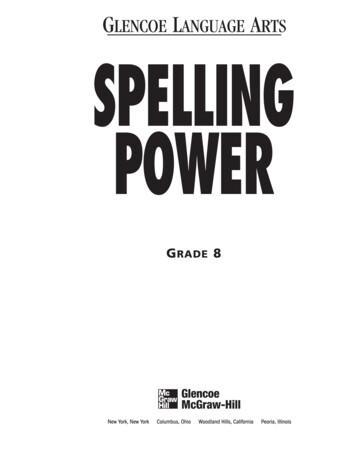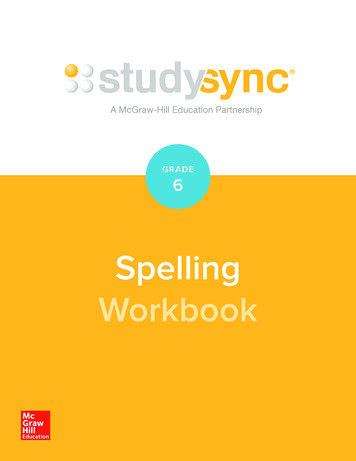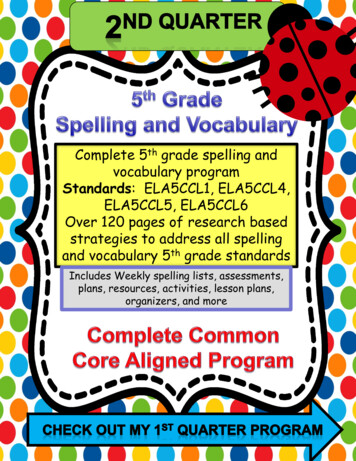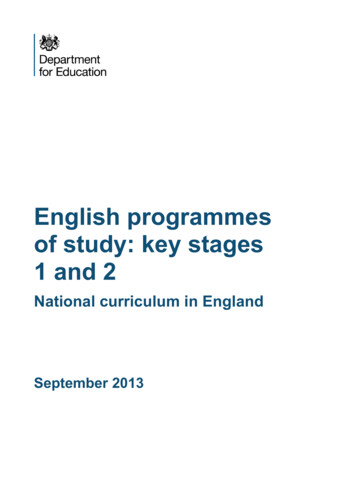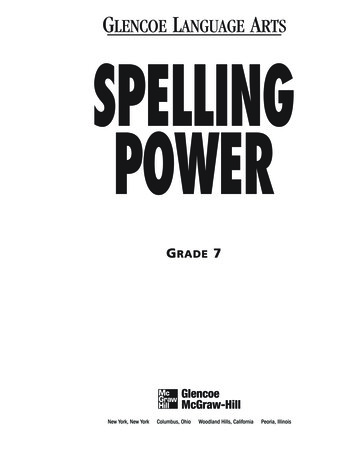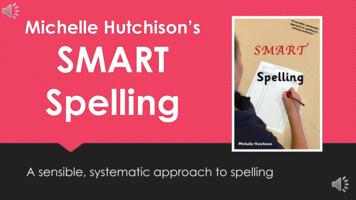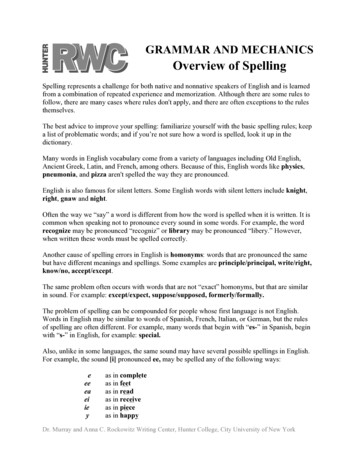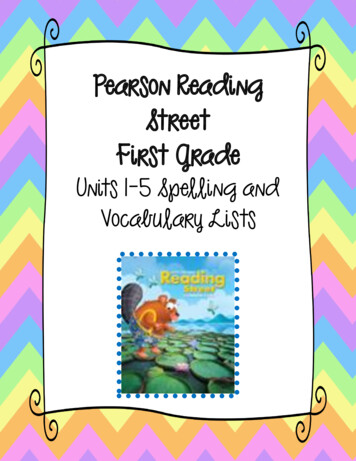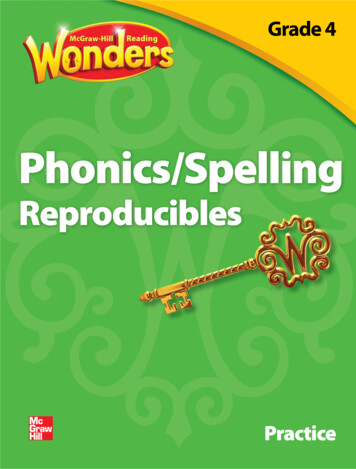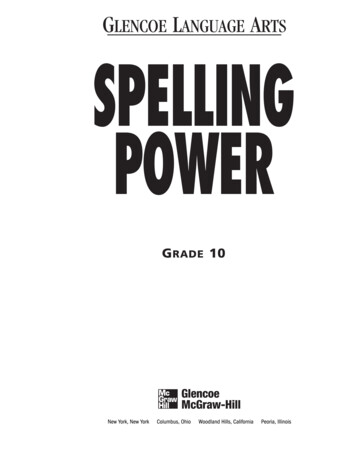
Transcription
GLENCOE LANGUAGE ARTSSPELLINGPOWERG RADE 10
To the StudentThis Spelling Power workbook provides the practice you need to improve your spelling andwriting ability and to expand your vocabulary. Each spelling lesson focuses on a single spellingpattern or concept that applies to a list of words in a Word Bank. You then have severalopportunities to practice what you’ve learned: writing the words, using them in sentences,recognizing and correcting them as you proofread, and applying the spelling pattern or concept to new words that follow the same pattern. If you have trouble with an exercise, you canalways go back to the Word Bank and Key Concepts discussion, review the material, and thenreturn to the exercise.You can keep track of your own progress and achievement in spelling by using the StudentProgress Chart, which appears on page v. With your teacher’s help, you can score your workon any lesson, quiz, or test. After you know your score, use the Scoring Scale on pages vi–viito figure your percentage. Then mark your score (or percentage correct) on the StudentProgress Chart. Share your Progress Chart with your parents or guardians as your teacherdirects.Glencoe/McGraw-HillCopyright by The McGraw-Hill Companies, Inc. All rights reserved. Except as permitted under the United States Copyright Actof 1976, no part of this publication may be reproduced or distributed in any form or means, or stored in a database or retrievalsystem, without the prior written permission of the publisher.Send all inquiries to:Glencoe/ McGraw-Hill8787 Orion PlaceColumbus, Ohio 43240ISBN 0-07-826246-1Printed in the United States of America1 2 3 4 5 6 7 8 9 10 024 05 04 03 02 01
CONTENTSStudent Progress Chart . . . . . . . . . . . . . . . . . . . . . . . . . . . . . . . . . . . . . . . . . . . . . . . . . . . . . . . . . . . . . . . . . . . . . . vScoring Scale . . . . . . . . . . . . . . . . . . . . . . . . . . . . . . . . . . . . . . . . . . . . . . . . . . . . . . . . . . . . . . . . . . . . . . . . . . . . . viUnit 1Lesson 1: Double Consonants . . . . . . . . . . . . . . . . . . . . . . . . . . . . . . . . . . . . . . . . . . . . . . . . . . . . . . . . . . . . . . .Lesson 2: Silent Consonants . . . . . . . . . . . . . . . . . . . . . . . . . . . . . . . . . . . . . . . . . . . . . . . . . . . . . . . . . . . . . . . .Lesson 3: Sounds of c and g . . . . . . . . . . . . . . . . . . . . . . . . . . . . . . . . . . . . . . . . . . . . . . . . . . . . . . . . . . . . . . . .Lesson 4: Use of ie and ei . . . . . . . . . . . . . . . . . . . . . . . . . . . . . . . . . . . . . . . . . . . . . . . . . . . . . . . . . . . . . . . . . .Review Lessons 1–4 . . . . . . . . . . . . . . . . . . . . . . . . . . . . . . . . . . . . . . . . . . . . . . . . . . . . . . . . . . . . . . . . . . . . . . .13579Unit 2Lesson 5: Vowel Spellings . . . . . . . . . . . . . . . . . . . . . . . . . . . . . . . . . . . . . . . . . . . . . . . . . . . . . . . . . . . . . . . . .Lesson 6: Diphthongs and Vowel r Shifts . . . . . . . . . . . . . . . . . . . . . . . . . . . . . . . . . . . . . . . . . . . . . . . . . . . .Lesson 7: Common Plural Forms . . . . . . . . . . . . . . . . . . . . . . . . . . . . . . . . . . . . . . . . . . . . . . . . . . . . . . . . . . .Lesson 8: Uncommon Plural Forms . . . . . . . . . . . . . . . . . . . . . . . . . . . . . . . . . . . . . . . . . . . . . . . . . . . . . . . . .Review Lessons 5–8 . . . . . . . . . . . . . . . . . . . . . . . . . . . . . . . . . . . . . . . . . . . . . . . . . . . . . . . . . . . . . . . . . . . . . .1113151719Unit 3Lesson 9: Doubling the Final Consonant . . . . . . . . . . . . . . . . . . . . . . . . . . . . . . . . . . . . . . . . . . . . . . . . . . . . . .Lesson 10: Syllabication . . . . . . . . . . . . . . . . . . . . . . . . . . . . . . . . . . . . . . . . . . . . . . . . . . . . . . . . . . . . . . . . . . .Lesson 11: Soft Final Syllables . . . . . . . . . . . . . . . . . . . . . . . . . . . . . . . . . . . . . . . . . . . . . . . . . . . . . . . . . . . . . .Lesson 12: Suffixes and the Silent e . . . . . . . . . . . . . . . . . . . . . . . . . . . . . . . . . . . . . . . . . . . . . . . . . . . . . . . . . .Review Lessons 9–12 . . . . . . . . . . . . . . . . . . . . . . . . . . . . . . . . . . . . . . . . . . . . . . . . . . . . . . . . . . . . . . . . . . . . .2123252729Unit 4Lesson 13: Suffixes and the Final y . . . . . . . . . . . . . . . . . . . . . . . . . . . . . . . . . . . . . . . . . . . . . . . . . . . . . . . . . .Lesson 14: The Suffixes -ance, -ence, -ant, -ent . . . . . . . . . . . . . . . . . . . . . . . . . . . . . . . . . . . . . . . . . . . . . . . .Lesson 15: The Suffixes -ize, -ise, -yze . . . . . . . . . . . . . . . . . . . . . . . . . . . . . . . . . . . . . . . . . . . . . . . . . . . . . . . .Lesson 16: Prefixes . . . . . . . . . . . . . . . . . . . . . . . . . . . . . . . . . . . . . . . . . . . . . . . . . . . . . . . . . . . . . . . . . . . . . . .Review Lessons 13–16 . . . . . . . . . . . . . . . . . . . . . . . . . . . . . . . . . . . . . . . . . . . . . . . . . . . . . . . . . . . . . . . . . . . .3133353739Unit 5Lesson 17: Noun Suffixes . . . . . . . . . . . . . . . . . . . . . . . . . . . . . . . . . . . . . . . . . . . . . . . . . . . . . . . . . . . . . . . . . .Lesson 18: Adjective Suffixes . . . . . . . . . . . . . . . . . . . . . . . . . . . . . . . . . . . . . . . . . . . . . . . . . . . . . . . . . . . . . . .Lesson 19: Verb Suffixes . . . . . . . . . . . . . . . . . . . . . . . . . . . . . . . . . . . . . . . . . . . . . . . . . . . . . . . . . . . . . . . . . .Lesson 20: Adverb Suffixes . . . . . . . . . . . . . . . . . . . . . . . . . . . . . . . . . . . . . . . . . . . . . . . . . . . . . . . . . . . . . . . .Review Lessons 17–20 . . . . . . . . . . . . . . . . . . . . . . . . . . . . . . . . . . . . . . . . . . . . . . . . . . . . . . . . . . . . . . . . . . . .4143454749Unit 6Lesson 21: The Word Roots cede/ceed/ces and cept/ceive . . . . . . . . . . . . . . . . . . . . . . . . . . . . . . . . . . . . . . . .Lesson 22: Common Greek Word Roots . . . . . . . . . . . . . . . . . . . . . . . . . . . . . . . . . . . . . . . . . . . . . . . . . . . . . .Lesson 23: Common Latin Word Roots . . . . . . . . . . . . . . . . . . . . . . . . . . . . . . . . . . . . . . . . . . . . . . . . . . . . . . .Lesson 24: Words Borrowed from Other Languages . . . . . . . . . . . . . . . . . . . . . . . . . . . . . . . . . . . . . . . . . . . .Review Lessons 21–24 . . . . . . . . . . . . . . . . . . . . . . . . . . . . . . . . . . . . . . . . . . . . . . . . . . . . . . . . . . . . . . . . . . . .Spelling Power5153555759Grade 10 iii
Unit 7Lesson 25: Possessives . . . . . . . . . . . . . . . . . . . . . . . . . . . . . . . . . . . . . . . . . . . . . . . . . . . . . . . . . . . . . . . . . . .Lesson 26: Homonyms . . . . . . . . . . . . . . . . . . . . . . . . . . . . . . . . . . . . . . . . . . . . . . . . . . . . . . . . . . . . . . . . . . .Lesson 27: Synonyms . . . . . . . . . . . . . . . . . . . . . . . . . . . . . . . . . . . . . . . . . . . . . . . . . . . . . . . . . . . . . . . . . . . .Lesson 28: Antonyms . . . . . . . . . . . . . . . . . . . . . . . . . . . . . . . . . . . . . . . . . . . . . . . . . . . . . . . . . . . . . . . . . . . .Review Lessons 25–28 . . . . . . . . . . . . . . . . . . . . . . . . . . . . . . . . . . . . . . . . . . . . . . . . . . . . . . . . . . . . . . . . . . . .6163656769Unit 8Lesson 29: Compound Nouns . . . . . . . . . . . . . . . . . . . . . . . . . . . . . . . . . . . . . . . . . . . . . . . . . . . . . . . . . . . . . .Lesson 30: Compound Adjectives . . . . . . . . . . . . . . . . . . . . . . . . . . . . . . . . . . . . . . . . . . . . . . . . . . . . . . . . . . .Lesson 31: Words Often Confused . . . . . . . . . . . . . . . . . . . . . . . . . . . . . . . . . . . . . . . . . . . . . . . . . . . . . . . . . .Lesson 32: Words Often Misspelled . . . . . . . . . . . . . . . . . . . . . . . . . . . . . . . . . . . . . . . . . . . . . . . . . . . . . . . . .Review Lessons 29–32 . . . . . . . . . . . . . . . . . . . . . . . . . . . . . . . . . . . . . . . . . . . . . . . . . . . . . . . . . . . . . . . . . . . .ivGrade 107173757779Spelling Power
STUDENT PROGRESS CHARTFill in the chart below with your scores, using the scoring scale on the next page.Name:LessonPretestOral QuizUnit 132ReviewSpelling PowerGrade 10 v
SCORING SCALEUse this scale to find your score. Line up the number of items with the number correct. For example, if 15out of 16 items are correct, your score is 93.7 percent (see grayed area).Number of ItemsNumber e 6.764.562.560.658.857.155.65452.651.350Spelling Power
Number of ItemsNumber .989.587.28510097.294.692.189.787.5Spelling Power363738394010097.3 10094.7 97.3 10092.3 94.9 97.4 10090 92.5 95 97.5 100Grade 10 vii
Name Date Class Lesson 1: Double ConsonantsWord ey ConceptsA single consonant sound is sometimes spelled with double consonants, as in assist and recess. Try to visualize these wordsspelled correctly as you commit them to memory. Note that some of the words in the Word Bank contain one double consonant, whereas others contain two pairs of double consonants.Spelling PracticeCopyright by The McGraw-Hill Companies, Inc.Circle the word in each set below that is spelled correctly. Then write the word on the line provided.1. accommodateaccomodateacommodate2. ireggularirreggularirregular3. occuppationoccupationocuppation4. tarrifftarifftarrif5. horrendoushorenndoushorrenndous6. comisioncommisioncommission7. mayonaisemayonnaisemayonnaisse8. exaggerrateexagerrateexaggerate9. 0. parallelSpelling in ContextUse context clues to determine which word from the Word Bank fits in each blank below. Then write theword on the line provided.1. is a condiment made of oil, egg yolks, vinegar, and lemon juice.2. A tax placed by a government on products imported into the country is a(n) .3. Two lines that never meet and are always the same distance apart are .4. A(n) is a job or career.5. Something that does not conform to accepted rules is .Spelling PowerGrade 10 1
Name Date Class LESSON 1 continuedProofreading ApplicationRead the paragraph below. Find the five misspelled words and circle them. Then write the correct spellings ofthe words on the lines below the paragraph.What an inoportune moment for the air-conditioning system to break down! We are going to have aneven more horendous problem tonight if we don’t figure out some way to accomodate the crowd ofpeople expected to attend the presentation by the student council’s Comission on School Vandalism. Ididn’t realize there would be such widespread interest in this report. Unless the student council hasexaggerrated the numbers, more people have signed up to attend than there are seats in the auditorium.1.4.2.5.3.Spelling ApplicationListed below are five additional words that contain double consonants. Find the words in the word maze andcircle them. Then write the words from the maze on the lines provided.hurricanepersonnelsymmetryterrificwhollyx r e p e a g r l n o n s l dd u t e h o h e r l d e r u pg h u r r i c a n e d s s e oCopyright by The McGraw-Hill Companies, Inc.u n g s y mme t r y a o s be a r o e d w t d c ms a f ts e v n n h b l l t y t o d oe t h n g e a c i f i r r e tt u d e t h l b x t u u v y nw h o l l y s r e e y x o k jk e mf j n ms t x a a z s u1.4.2.5.3.2Grade 10Spelling Power
Name Date Class Lesson 2: Silent ConsonantsWord mpsychologywrathKey ConceptsMany English words contain silent consonants.The words may be difficult to spell because they cannot be sounded out, andthere are no general guidelines for spelling them. Study the words so that you can visualize them as you write.Each of the words in the Word Bank contain silent consonants.silent n: columnsilent k: knacksilent g: gnarledsilent s: islandsilent gh: droughtsilent w: wrathsilent b: doubtsilent p: psalm, psychologysilent h: ghettoSpelling PracticeIn each sentence below, find the misspelled word and circle it. Then write its correct spelling on the lineprovided.1. I dout that Ellie will come to the sophomore dance.2. That section of the city is considered a getto.Copyright by The McGraw-Hill Companies, Inc.3. When you have finished, each colum on thesheet should contain twelve words.6. My grandmother grew up on an iland in the Caribbean.7. Julia has an exceptional nack for anticipating fashion trends.8. Because of the continuing drougt, there is a serious watershortage in our area.4. The knarled tree is more than two hundred years old. 9. The choir sang a salm I had never heard before.5. I am thinking of majoring in sychology in college.Spelling Power10. If you forget to bring in your homework, you risk incurringthe rath of Mrs. Major.Grade 10 3
Name Date Class LESSON 2 continuedSpelling in ContextComplete each sentence below with the correct word from the Word Bank.1. The old woman’s hands were because of arthritis.2. The corn crop was badly damaged this year by the .3. I that Ryan will win the election for student council.4. I was familiar with the that the minister read at my friend’s wedding.Proofreading PracticeRead the paragraph below. Find the six misspelled words and circle them. Then write the correct spellings ofthe words on the lines below the paragraph.The sychology books are due to arrive soon in the Long Iland warehouse, but I dout they will bedelivered before Tuesday. In the appropriate columm, indicate the number of copies needed. The bookhas received excellent advance reviews. It focuses on how people who grew up in a getto adapt to living in communities with a diverse population when they are adults. Our thanks go to Toby for selectingthis book. She certainly has a nack for making excellent choices.1.3.5.2.4.6.Spelling oniapseudonymthroughwriteAcross1. to form words5. what has been learned7. comes after seventh9. to strike something10. the season of fallDown2. in one side and out the other3. fictitious name4. disease of the lungs6. money a person owes8. to chew and bite4Grade 1012345678910Spelling PowerCopyright by The McGraw-Hill Companies, Inc.Listed below are ten additional words that contain silent consonants. Read each crossword puzzle clue. Thendetermine which word from the list matches the clue and write the word in the squares provided.
Name Date Class Lesson 3: Sounds of c and gWord inerateingeniousmenacepigeonKey ConceptsThe consonants c and g may sound soft or hard depending on the vowels or consonants that follow them. Knowing the following patterns will help you spell words that include the letters c and g. There are very few words that do not follow thesepatterns.1. When c is followed by a, o, or u, it is usually pronounced with a hard sound. A hard c sounds like \k\, as incondolences.2. When the letter g is followed by a, o, or u, it is usually pronounced with a hard sound. A hard g sounds like \g\, as inguilty.3. When the letter c is followed by e, i, or y, it is usually pronounced with a soft sound. A soft c sounds like \s\, as inmenace, cease, excessive, and incinerate.4. When the letter g is followed by e, i, or y, it is usually pronounced with a soft sound. A soft g sounds like \j\, as inpigeon, genial, gerund, and ingenious.Spelling PracticeCopyright by The McGraw-Hill Companies, Inc.Listed below are four sound patterns. On the lines below each pattern, write the word or words from theWord Bank to which it applies. One word fits two patterns. There will not be a word for every line.1. hard c3. hard g2. soft c4. soft gSpelling PowerGrade 10 5
Name Date Class LESSON 3 continuedSpelling in ContextComplete each sentence with the correct word from the Word Bank.1. All activities must immediately so that we can prepare to leave.2. He developed an computer game that sold millions of copies.3. A is a verb that ends in -ing and is used as a noun in a sentence.4. It is now illegal to leaves and other yard waste in many communities.5. I was surprised to see a in my suburban backyard.Proofreading PracticeRead the paragraph below. Find the five misspelled words and circle them. Then write the correct spellings ofthe words on the lines below the paragraph.When I offered my neighbors condolenses following the death of their beloved German shepard, Ifelt gilty about not having done so earlier. He was a loyal dog with an almost human jenial manner, notat all how many people picture German shepards. Good guard dogs can appear to be a menass toone’s safety. However, it never did sease to amaze me how gentle and devoted this dog was to hisfamily.1.4.2.5.3.Listed below are six additional words that fit the patterns you have learned. Write the word or words to whicheach pattern applies on the lines provided. Then fill in the remaining blanks with additional illahard c:hard g:soft c:soft g:6Grade 10Spelling PowerCopyright by The McGraw-Hill Companies, Inc.Spelling Application
Name Date Class Lesson 4: Use of ie and eiWord hborneitherpiercesleighyieldKey ConceptsYou might have difficulty remembering whether to use i before e or e before i in spelling many words. In most words, i comesbefore e except when it follows a c. However, there are several additional spelling patterns that will help you to identify whichof the two vowels should come first. As usual, there are exceptions.–1. Use the ei spelling when you hear the \a \ sound, as in neighbor and sleigh.2. Use the ei spelling when the letter c spells the \s\ sound, as in conceit.3. Use the ie spelling when the letter c spells the \sh\ sound in a word, as in deficient.Spelling PracticeCopyright by The McGraw-Hill Companies, Inc.Draw a line through the word in each set that is spelled incorrectly. Then write the word correctly.1. sleighsliegh6. acheivementachievement2. nietherneither7. peircepierce3. caffeinecaffiene8. besiegebeseige4. concietconceit9. yeildyield5. neighbornieghbor10. deficientdeficeintSpelling in ContextDecide which word from the Word Bank is defined in each phrase below. Then write the word on the lineprovided.1. to make a hole through2. to surround with armed forces3. a stimulant found in coffee and cola4. a horse-drawn vehicle used on snow or ice5. to give right of way to anotherSpelling PowerGrade 10 7
Name Date Class LESSON 4 continuedProofreading PracticeRead the paragraph below. Find the five misspelled words and circle them. Then write the correct spellings ofthe words on the lines below the paragraph.I assumed Ray was just displaying his conciet when he told me that he did well on the statewideacheivement tests. However, he was actually being modest. I found out that he received the highestscore in our whole school. At the other extreme are people like me, who scored in the "deficeint"range on a section or two. Maybe I should ask him for some help so I can raise my score next year. I’mnot the only one who didn’t do very well; niether did my nieghbor Greg.1.4.2.5.3.Spelling ApplicationListed below are ten additional words that fit the patterns you have learned. Read each crossword puzzleclue. Then determine which word matches the clue and write the word in the squares isurereignspeciesspielunwieldyweirdAcross4. leader of a band, tribe, or clan5. extravagant talk6. strange8. fake234Copyright by The McGraw-Hill Companies, Inc.Down1. one who deals with large investments2. to rule3. hard to handle4. sense of right and wrong5. a single, distinct kind of plant or animal7. relaxation time165788Grade 10Spelling Power
Name Date Class Unit 1 ReviewLessons 1– 4In each sentence below, find the misspelled word and circle it. Then write its correct spelling on the lineprovided.1. I had a turkey sandwich with Swiss cheese and mayonaise for lunch.2. The two lines must be paralell so that you can measure the angles formedby the intersecting ray.3. My friend prefers to insinerate his trash rather than take it to the dump.4. Kerry’s brother looked very gilty when she announced her diary was missing.5. Chuck wants to major in sychology at the university.6. There was an indefinable air of menise about the place.7. Jordan risked the rath of his mother when he neglected to take out the trash.8. Al’s scores indicated that he was deficeint in the areas of algebra and geometry.9. The police officer issued a ticket for failure to yeild at an intersection.10. The protestors were ordered to sease and desist immediately or face criminalcharges.Draw a line through the word in each set that is spelled incorrectly. Then write the word correctly.Copyright by The McGraw-Hill Companies, Inc.11. jerund15. gnarled18. slieghgerundnarledsleigh12. pigeon16. acheivement19. nieghborpijeonachievementneighbor13. salm17. conceit20. piercepsalmconcietpeirce14. gettoghettoSpelling PowerGrade 10 9
Name Date Class Proofreading ApplicationLessons 1– 4Read the letter below. Find the twenty misspelled words and circle them. Then write the correct spellings ofthe words on the lines below the letter.Dear Myles,Sincerely,George1. 8.15.2. 9.16.3. 10.17.4. 11.18.5. 12.19.6. 13.20.7. 14.10Grade 10Spelling PowerCopyright by The McGraw-Hill Companies, Inc.I want to thank you for arranging for me to meet with your staff last week. It was especially kind ofyou to accomodate the scheduling problems caused by my flight delay. You certainly have a nack forinjenious solutions to tricky problems.I found the atmosphere in the office a jenial one. I felt comfortable immediately, especially with yourassistant manager, Ray Thorp. Please extend my condolenses to him on the sudden loss of his father.I am thinking of writing a colum in my next newsletter about your firm. I hope that niether you norRay will mind. I dout that many people are familiar with your management techniques, and I think thatmy readers will be interested in learning about them. However, I want to warn you that people maybeseige you with requests for more information. On the positive side, I'm sure the publicity will generate more business.I returned home to find that the water restrictions caused by the drout had been lifted. In fact, myplane landed in a horendous storm. I leave again shortly, this time for a trip to a small iland off thecoast of South Carolina.I have been doing so much flying lately that I find my sleep cycle has become quite iregular. I’mdepending more and more on caffiene to keep me awake. Then I can’t sleep at night. Such are the hazards of my ocupation, although I do not exagerate when I say that I wake up each morning eager to getto work.By the way, next month I am scheduled to speak before the Senate Comission on Tarifs. I intend toraise the points you made about how exccessive rates are damaging your business. Unfortunately thismay be an inoportune time to bring up the topic. I’m not sure the committee members are open tonew ideas.Again, please accept my thanks. It was truly a pleasure to see you again.
Name Date Class Lesson 5: Vowel SpellingsWord elainprevailreverieweanKey ConceptsYou may have learned the following spelling rhyme when you were younger:When two vowels go walking, the first one does the talking.This guideline means that when two vowels are together in a word, the first vowel is usually pronounced words with the longvowel sound and the second vowel is silent. The vowel pairs in these words illustrate this concept:complaint \ \ , doughy \ \ , cue \k \ , prevail \ \ , and wean \ƒ\.Many words have vowel pairs that do not follow the regular pattern. You must visualize the words spelled correctly.1. In some words, the short vowel sound of the first vowel is pronounced, as in pheasant (\e\) and endeavor (\e\).2. In others, the short sound of the second vowel is pronounced, as in porcelain (\i \).3. In still other words, the long sound of the second vowel is pronounced, as in reverie (\ƒ\) and euphoria (\ \).Spelling PracticedCopyright by The McGraw-Hill Companies, Inc.Draw a line through the word in each set that is spelled incorrectly. Then write the word correctly on the lineprovided.1. cueprevale2. uphoriadoughy3. reverieporcelin4. phesantwean5. complayntendeavorSpelling in ContextdComplete each sentence below with the correct word from the Word Bank.1. The rolls tasted too2. I am trying to, as if they had not been baked long enough.myself from my dependence on coffee.3. In Great Britain, the public shouts with4. Citizens must5. The couple servedSpelling Powerwhenever the Queen appears.to improve the country.as the main course at their wedding reception.Grade 10 11
Name Date Class LESSON 5 continuedProofreading PracticedRead the paragraph below. Find the five misspel
This Spelling Power workbook provides the practice you need to improve your spelling and writing ability and to expand your vocabulary. Each spelling lesson focuses on a single spelling pattern or concept that applies to a list of words in a Word Bank. You then have
